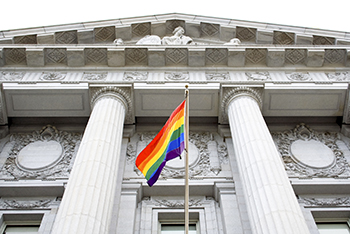 Sept. 5, 2014 – Another federal court has struck down same-sex marriage bans. A three-judge panel for the U. S. Court of Appeals for the Seventh Circuit has ruled same-sex marriage bans in Wisconsin and Indiana are unconstitutional. Wisconsin’s same-sex marriage ban was instituted as a constitutional amendment in 2006.
Sept. 5, 2014 – Another federal court has struck down same-sex marriage bans. A three-judge panel for the U. S. Court of Appeals for the Seventh Circuit has ruled same-sex marriage bans in Wisconsin and Indiana are unconstitutional. Wisconsin’s same-sex marriage ban was instituted as a constitutional amendment in 2006.
“We’ll see that the governments of Indiana and Wisconsin have given us no reason to think that they have a reasonable basis for forbidding same-sex marriage,” writes Judge Richard Posner, prefacing a 40-page opinion in the consolidated cases of Virginia Wolf et al v. Scott Walker et al. & Marilyn Baskin et al. v. Penny Bogan et al. (Sept. 4, 2014).
Judge Barbara Crabb of the U.S. District Court for the Western District of Wisconsin had ruled in June that Wisconsin’s same-sex marriage ban, which Wisconsin voters passed by referendum in 2006, violated constitutional protections. A federal district judge in Indiana struck down Indiana’s same-sex marriage ban also.
The Seventh Circuit Appeals Court, which covers numerous Midwestern states, including Wisconsin and Indiana, heard oral arguments just last week. However, same-sex marriages are still on hold until the appeals process is concluded.
Reportedly, Wisconsin Attorney General J.B. Van Hollen will appeal the decision. Thus, the case could ultimately be decided by the United States Supreme Court.
The Seventh Circuit Court of Appeals already denied a motion to hear the case en banc in July, which sets the stage for a direct appeal to the nation’s high court.
The Decision
“Our pair of cases is rich in detail but ultimately straight-forward to decide,” wrote Judge Posner, joined by Judge David Hamilton and Judge Ann Claire Williams.
“The challenged laws discriminate against a minority defined by an immutable characteristic, and the only rationale that the states put forth with any conviction – that same-sex couples and their children don’t need marriage because same-sex couples can’t produce children, intended or unintended, is so full of holes that it cannot be taken seriously,” wrote Posner, one of the most well-known federal judges in the country.
Judge Posner noted that same-sex couples can adopt children whose biological parents have abandoned them or otherwise cannot care for them, “and those children would be better of both emotionally and economically if their adoptive parents were married.”
As the panel explained, plaintiffs who challenge legislation as unconstitutional normally have a tough hill to climb, because legislation must be upheld if it has some rational basis – some articulable reason for treating people differently.
But the court noted that in this case, the state needed to show more than a “rational basis,” because classification at issue proceeds “along suspect lines.”
“Discrimination by a state or the federal government against a minority, when based on an immutable characteristic of the members of that minority (most familiarly skin color and gender), and occurring against an historical background of discrimination against the persons who have that characteristic, makes the discriminatory law or policy constitutionally suspect,” Judge Posner wrote.
A suspect classification overcomes a presumption that it violates equal protection, the appeals panel noted, if the state shows compellingly “that the benefits of the discrimination to society as a whole clearly outweigh the harms to its victims.”
“[I]n a same-sex marriage case the issue is not whether the heterosexual marriage is a socially beneficial institution but whether the benefits to the state from discriminating against same-sex couples clearly outweighs the harms that this discrimination imposes,” Judge Posner explained.
Then panel went on to explain that the harm in denying same-sex couples a right to marry is considerable, both psychologically and tangibly.
That is, while disparagement of their sexual orientation is “a source of continuing pain,” it also harms them by denying certain benefits associated with married couples.
On the other hand, Wisconsin and Indiana failed to show that the benefits of denying same-sex marriage on society as a whole clearly outweigh the harm to homosexuals.
Indiana said the state legalizes marriage for one reason: to protect children in the event that a biological parent tries to abandon his or her parental obligations.
There is no need to legalize same-sex marriage, Indiana argued, because same-sex couples cannot have children. However, the appeals court panel rejected that argument.
“[I]f channeling procreative sex into marriage were the only reason that Indiana recognizes marriage, the state would not allow an infertile person to marry,” wrote Posner, noting that Indiana law allows first cousins to marry after proving infertility.
“Indiana has thus invented an insidious form of discrimination: favoring first cousins, provided they are not of the same sex, over homosexuals,” Posner wrote.
The panel also struck down Wisconsin’s arguments: that the tradition of limiting marriages to same-sex couples is a valid basis for limiting legal rights; the unforeseen consequences of allowing same-sex marriage allows Wisconsin to move “cautiously” or “slowly” in the area of same-sex marriage; the democratic process should be left alone; and same-sex marriage is analogous in its effects to no-fault divorces.
As to the democratic process, Posner noted: “Minorities trampled on by the democratic process have recourse to the courts; the recourse is called constitutional law.”
“To return to where we started in this opinion, more than unsupported conjecture that same-sex marriage will harm heterosexual marriage or children or any other valid and important interest of the state is necessary to justify discrimination on the basis of sexual orientation,” Judge Posner wrote for the three-judge panel.
“As we have been at pains to explain the grounds advanced by Indiana and Wisconsin for their discriminatory policies are not only conjectural; they are totally implausible.”
